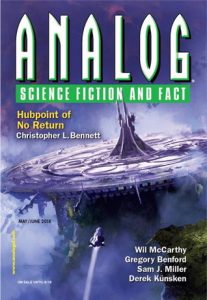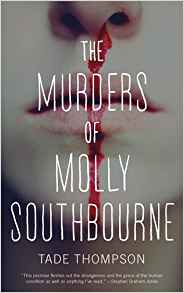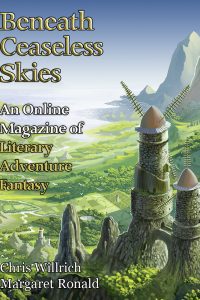Rich Horton Reviews Short Fiction from Tor.com, Analog, and Asimov’s
Tor.com 5/18
Analog 5-6/18
Asimov’s 5-6/18
 Just as I was preparing this month’s column I heard the stunning news of the hospitalization, rapid decline, and death, of my colleague here at Locus, Gardner Dozois. Gardner was not just my colleague, both as Locus short fiction columnist and as anthologist, he was a friend. He treated me from the first as an equal, as I surely was not; always happy to discuss the field, to discourse upon and debate about its history. In person he was famously open and almost boisterous, and always gracious and accepting, self-deprecating to a fault. We remember, as we should, his remarkable career as an editor – at Asimov’s, of course, and of his long running best-of-the-year anthology series, but of numerous other anthologies, original and reprint, and a strong critical writer as well. We should also not forget his fiction, which was remarkable and is in danger of being overlooked – stories like “Chains of the Sea”, “Horse of Air”, “A Special Kind of Morning”, “The Visible Man”, “Strangers”, “A Knight of Ghosts and Shadows”, and his Nebula winners “Morning Child” and “The Peacemaker” prove him the equal of any writer of his generation.
Just as I was preparing this month’s column I heard the stunning news of the hospitalization, rapid decline, and death, of my colleague here at Locus, Gardner Dozois. Gardner was not just my colleague, both as Locus short fiction columnist and as anthologist, he was a friend. He treated me from the first as an equal, as I surely was not; always happy to discuss the field, to discourse upon and debate about its history. In person he was famously open and almost boisterous, and always gracious and accepting, self-deprecating to a fault. We remember, as we should, his remarkable career as an editor – at Asimov’s, of course, and of his long running best-of-the-year anthology series, but of numerous other anthologies, original and reprint, and a strong critical writer as well. We should also not forget his fiction, which was remarkable and is in danger of being overlooked – stories like “Chains of the Sea”, “Horse of Air”, “A Special Kind of Morning”, “The Visible Man”, “Strangers”, “A Knight of Ghosts and Shadows”, and his Nebula winners “Morning Child” and “The Peacemaker” prove him the equal of any writer of his generation.
Tor.com‘s May offerings are exceptional. James Patrick Kelly‘s “Grace’s Family” is set on Grace, a survey ship. As the story opens, Jojin, a young man, is living with his sister Qory and their mom and dad on Grace. Their dad is getting old, and his mental functions seem to be degrading. When they enter a new star system, one of many they are surveying, instead of continuing their survey they meet up with another ship – Grace’s sister Mercy – and mom and dad leave, traded for another woman, Orisa. They are to be a new family – but, we begin to ask, what is family here? And what of the mention that Qory, and their mom, are bots? And what is the purpose of the virtual story environments they all repeatedly enter? This is fascinating original SF, deeply concerned with the purpose of intelligence in the universe.
“The Guile” by Ian McDonald is a clever caper story set at a casino in Reno and told by Pernell, a former pit boss now working as a driver, about his friend, an aging and down-on-his-luck magician. An AI used for detecting cheaters takes an interest, as a sort of side project, in figuring out the magician’s tricks, which it does easily enough. Then Pernell has an idea – how about a showdown between the magician and the AI? If the magician can do a trick that the AI can’t figure out, he wins – and he wins anyway, because at least once this will make him a bit of money. Like all good caper stories, there is a sweet, thematically integrated final twist. Lavie Tidhar‘s “Yiwu” is also about magic, in a way – Eshamuddin is a lottery ticket seller in a future Chinese city (in Tidhar’s ongoing Central Station future). The kick is that the lottery gives winners their true heart’s desire – which can be pretty magical, and pretty unexpected. But one day a woman who has been a regular at Eshamuddin’s shop wins – and nothing happens, which brings trouble to him…. This is fine, quiet, strange, and subtle work.
Asimov’s for May/June opens and closes with two entertaining novellas. Rick Wilber & Alan Smale offer “The Wandering Warriors“, about a semipro baseball team just after WWII (in a slightly alternate history) who are transported to ancient Rome, at the time of the interregnum between the Emperor Septimius Severus and his two sons, Caracalla and Geta. Luckily their catcher and leader, the Professor, knows Latin, and they land on their feet, so to speak, ending up in the Colosseum for a baseball tournament in celebration of the two new Emperors. Of course, there is intrigue, involving the famously awful Caracalla and his rivalry with his somewhat nicer brother, and their mother, Julia Domna, who turns out to be a good baseball player in her own right (though in our history she’d have been about 50 at the time). I have to say the Romans ready adoption of baseball didn’t really convince me, but the story remains a good read.
Even better – one of the best novellas of the year to date – is “Bubble and Squeak” by David Gerrold & Ctein. Bubble and Squeak are James Liddle and Hu Son, who are planning to get married and then head to Hawaii on their honeymoon, but they hear that there has been a major earthquake in Hawaii – so no honeymoon. They then realize that the earthquake means a tsunami is heading to their home in Los Angeles, which means they need to get to higher ground pronto. Fortunately, James is a SCUBA instructor. They head out quickly on their bikes with what they can carry, including some SCUBA equipment. Of course, everyone else is heading for higher ground as well…. The story is simply terrifically exciting, involving a plausible mix of heroism, foolishness, brutality, luck, and intelligence, on their part and others, as they struggle to find a way to a safe place, and as various options are closed off over time. Really exciting work.
I thought the best short stories in this issue were from Paul Park and from Sandra McDonald & Stephen D. Covey. Park’s “Creative Nonfiction” is about a writing professor and one of his students, a young woman named Taylor McLeef. There’s a suggestion that the professor is attracted to his student (or has perhaps been serially attracted to various students over the years), and Taylor’s class assignments, a bit metafictionally, seem to be used as threats against him, in an attempt to improve her grades. Then the story takes an intriguing turn, as the question of posthumanity is introduced – perhaps Taylor has particular powers? Park’s narrative strategies effectively ramp up the mystery behind all this. McDonald & Covey, in “Time Enough to Say Goodbye“, tell a sweet time-travel story that is also a story about asteroid exploration, as a woman repeatedly visits the past to try to meet the two people involved in critical early experiments that will lead to asteroid mining. Her reasons – personal ones – become clear as the story develops. Nothing earthshaking here, but this is nice work.
Analog’s May-June issue includes several intriguing short stories. Marissa Lingen‘s “Finding Their Footing” is about a woman and her two children, who have divorced their family in the Oort after her husband’s death, and who are moving to Triton to look for a new position, hoping to stop at Callisto to witness a cryovolcano eruption on the way. This is one of several stories Lingen has published about a future society in the Outer System, and they are collectively fascinating in their details about the structure and dynamics of that society. This piece is quiet, a minor work perhaps, but quite enjoyable, and I hope to see many more stories (or a novel) in this milieu.
Sam J. Miller makes his first appearance in Analog with a moving story, “My Base Pair“, about Thatch, who is trying to reconnect with his long-lost childhood friend, Kenji, who has disappeared. Kenji is a “hacksperm”: born with the stolen genes of a celebrity (Tom Cruise) in an environment where vicious prejudice against such children is rife. Thatch has become an investigator into the criminal aspects of disappearing hacksperm kids, perhaps not realizing how his work might actually increase the oppression that the innocent children of stolen genetic material face. He has tracked down an illegal fight between another “cruise” and someone he hopes is Kenji, and tries to finagle information about Kenji’s location from this other man. The story intertwines Thatch’s memories of his childhood times with his friend, and his more recent painful memories of an affair with a journalist investigating the whole issue. It’s very strong on the personal aspects of Thatch’s life, and very interesting on some of the scientific and social ramifications of the “hacksperm” tech, but perhaps doesn’t quite convince on the truly vicious legal and societal reaction to the (innocent) children.
Recommended Stories
“Bubble and Squeak”, David Gerrold & Ctein (Asimov’s 5-6/18)
“Grace’s Family”, James Patrick Kelly (Tor.com 5/18 )
“Finding Their Footing”, Marissa Lingen (Analog 5-6/18)
“Time Enough to Say Goodbye”, Sandra McDonald & Stephen B. Covey (Asimov’s 5-6/18)
“Creative Nonfiction”, Paul Park (Asimov’s 5-6/18)
“Yiwu”, Lavie Tidhar (Tor.com 5/18)
Rich Horton works for a major aerospace company in St. Louis MO. He has published over a dozen anthologies, including the yearly series The Year’s Best Science Fiction and Fantasy from Prime Books, and he is the Reprint Editor for Lightspeed Magazine. He contributes articles and reviews on SF and SF history to numerous publications.
This review and more like it in the July 2018 issue of Locus.
 While you are here, please take a moment to support Locus with a one-time or recurring donation. We rely on reader donations to keep the magazine and site going, and would like to keep the site paywall free, but WE NEED YOUR FINANCIAL SUPPORT to continue quality coverage of the science fiction and fantasy field.
While you are here, please take a moment to support Locus with a one-time or recurring donation. We rely on reader donations to keep the magazine and site going, and would like to keep the site paywall free, but WE NEED YOUR FINANCIAL SUPPORT to continue quality coverage of the science fiction and fantasy field.






